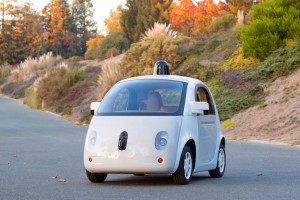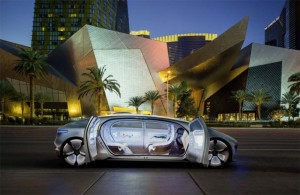
Google's self-driving car took another step toward reality as the company used prototypes to give a focus group a few test drives.
Without a single model yet on the road, American motorists are anxiously awaiting the arrival of the first autonomous vehicles – and are willing to pay a significant premium for technology that could make the highways safer while boosting fuel economy, as well, says a new study.
More than half of all U.S. motorists show high interest in buying either a partially or fully autonomous vehicle, according to research by the Boston Consulting Group, and some would be willing to pay as much as a $5,000 premium.
The study forecasts the first semi-autonomous vehicles will reach market by 2016, with fully autonomous models due by 2025, by which point BCG predicts the market for the technology will be worth $42 billion annually.
“This is pretty significant considering nobody has yet driven one of these vehicles,” said Xavier Mosquet, the North American leader of the consulting firm’s automotive practice.
Autonomous technology has become a major topic in the automotive community, and virtually every major carmaker is now working to develop some version of the technology – as are some non-automotive companies, notably including tech giant Google, which is rolling out a fleet of 100 self-driving prototypes.
Cadillac has already promised to put a limited version, dubbed SuperDrive, in its planned new flagship sedan, the CT6, in 2016. It will allow hands-free driving on limited access highways. BCG expects Mercedes-Benz to come to market with an early, semi-autonomous vehicle by then, and Google may find a partner willing to integrate its software into their vehicles, as well.
Nissan has promised to put a fully autonomous vehicle into production by 2020, though the study anticipates it will likely take several years longer to reach that goal.
In the meantime, makers will likely roll out a variety of specialized semi-autonomous systems:
- Those, like Caddy’s SuperDrive, that can work only on limited-access highways;
- Vehicles that can operate autonomously only on specific routes, such as a motorist’s daily commute route;
- Systems that can operate at low speeds in heavy traffic; and
- Auto Park Valet systems that could drop a motorist off at a destination, then drive off to a parking spot until summoned to return.
BMW demonstrated a version of a valet parking system at the Consumer Electronics Show in Las Vegas last week, while Mercedes-Benz debuted a fully autonomous concept vehicle, called the F 015 Luxury in Motion.
More than 65% of those surveyed by BCG said they would be interested in one or more of the semi-autonomous systems. And a “significant portion” of those who participated in the study indicated they would be willing to pay a premium. A full 20%, noted Mosquet, would spend as much as $5,000 or more for autonomous technology.
In fact, BCG estimated the most basic semi-autonomous technologies will likely cost at least $2,000, and push up to $4,000. Fully autonomous technology would be even more costly, which is likely to mean self-driving cars will first appear in the luxury segment of the market.
Despite broad public support, there was some pushback, a small percentage of the survey’s respondents rejecting the idea of ever owning an autonomous vehicle. The biggest concern was not being able to control the vehicle at all times, with other skeptics saying they wouldn’t feel safe, or would worry about the vehicle making a mistake.
“But overall,” said Mosquet, “people clearly associate autonomous vehicles with safety.”
Proponents of the technology contend self-driving technology will result in far fewer highway crashes, deaths and injuries. They anticipate freeways that can flow more smoothly, even with higher levels of traffic. And that, the argument goes, would yield significant improvements in fuel economy.

